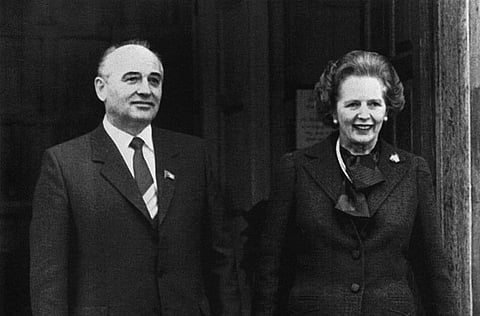Margaret Thatcher: A Cold War angel and a democratic miracle
A strong foreign affairs posture was central to Thatcher’s outlook

For young Europeans, it must be difficult to imagine the routine deprivation that existed behind the Iron Curtain when Margaret Thatcher came to power. As a refugee in London during the 1980s, I had to smuggle necessities to my family in Poland: Toothpaste, shampoo, washing powder and, hidden in the parcels, miniature editions of books that were banned there. Occasionally, these were found and confiscated — including, in 1984, a copy of Nineteen Eighty-Four. Thatcher’s role in changing all this cannot be overstated. For those behind the Iron Curtain, she was a member of the anti-communist “Holy Trinity” — consisting of Pope John Paul II, Ronald Reagan and herself — who altered the fate of the West and consequently the fate of those outside it.
She did in the West what Solidarity did in the East. Solidarity was a workers’ movement against the communist state, which exposed the illegitimacy of the Communist Party’s claim to represent the working class. Thatcher similarly turned the tide: Until she entered the fray, it was assumed that capitalism was ultimately going to converge with communism — and that a bigger and bigger role for the state was inevitable. She put an end to that. By rejuvenating Britain, she made the strongest possible case against the model of the command economy in both its hard and soft forms.
What inspired Poles most was that with Reagan and John Paul II, she was a deeply moral politician. The Poles greatly admired her clear-headedness with regard to the rights and wrongs of the Cold War. Thatcher believed in the justice and morality of a free society. And not just the evil, but also the anthropological mistakes of communism. She had it right, in other words, that people were willing to work hard on behalf of their family and their country — as long as the fruits of their labour were left as much as possible to themselves. This was the direct opposite of what we were taught under communism, namely that only an enforced altruism could build a prosperous society. I believe that her visit to Poland in 1988 was an important factor behind the Communist Party’s decision to start negotiations with the Solidarity opposition. Preceded by Malcolm Rifkind — another figure Poles remember fondly — she travelled to Gdansk to meet Lech Walesa, which established him immediately as an alternative leader, even while General Jaruzelski’s military junta remained in charge. By all accounts, Thatcher gave Walesa sensible advice about the need to prepare for government. Indeed, if you look at the shock therapy prescribed by Poland’s first finance minister, Leszek Balcerowicz, it is clear that it was inspired by Thatcher’s radicalism. These reforms were a bitter pill to swallow, wiping out savings and causing unemployment for the first time. But they reintroduced the free market and meant that Poland’s post-communist depression was the shortest and shallowest in the post-Soviet world. The boldness of the reforms also inspired Poles to introduce a constitutional brake on the national debt at 60 per cent of gross domestic product.
A strong foreign affairs posture was, it hardly needs saying, central to her outlook. I will never forget visiting her as deputy defence minister in 1992, when the Polish government was trying to force the withdrawal of Soviet troops from Poland. She gave me a hugely helpful handwritten note of support, which I keep framed on my wall. Thatcher was much more realistic about Europe while in office than she subsequently — and regrettably — became in retirement. As prime minster, she was a signatory to the Single European Act and it was under her that the single market was conceived by the United Kingdom — one of the keystones of Europe’s success today. But she then advised Poland not to join the European Union — an advice which, I must say, Poles were happy to ignore.
In her retirement, she stuck rigidly to the idea of British exceptionalism. This was unfortunate, because Europe is too important to be left to the Left. Europe needs principled leadership and a Thatcherite message of living within your means, of competition and of a strong posture towards the outside world. If Thatcher had become the president of the European Commission, she could have converted Europe and might have become a convert. Europe would not have had to deal with such deep indebtedness and might have been on the way to becoming a superpower. What she never understood was that the Commission is actually a force for Thatcherism — for responsible budgets, for smashing national monopolies and for opening up markets. Whatever her critics may say, however, Thatcher also got the big picture right. She stood on the side of the angels in the Cold War and provided leadership for as long as the Soviet Union needed to be challenged. She also had the wisdom to recognise that Mikhail Gorbachev had the potential to achieve historic change.
Thatcher was a symbol of universal values: Toughness in adversity, self-reliance, success through hard work. She will be remembered as an iconic figure of what Poles used to call the “West”. People in the former Eastern Europe, meanwhile, will continue to remember her with gratitude as someone who hastened the day when Eastern Europe joined the family of democratic nations.
— The Telegraph Group Ltd, London, 2013
Radek Sikorski is Poland’s Minister of Foreign Affairs.


